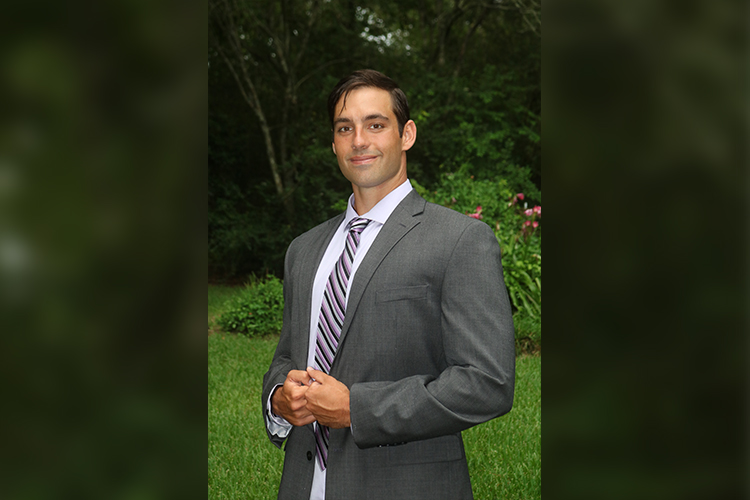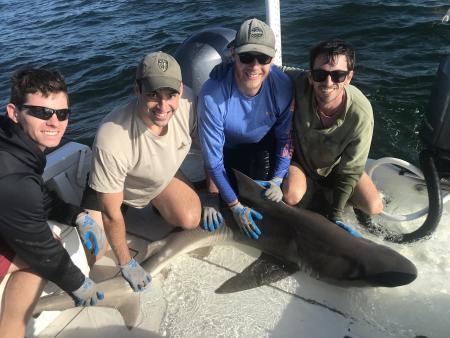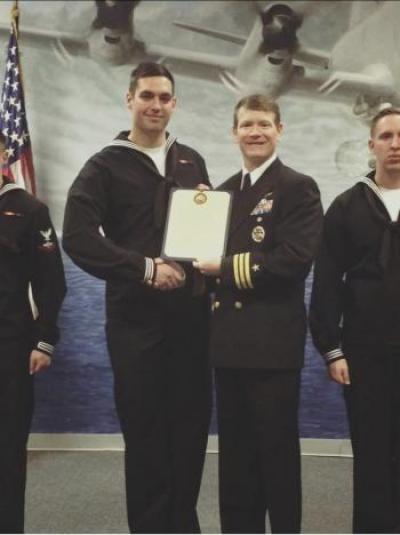Alumni Spotlight: Benton Jaco

Florida State University marine biology alumnus Benton Jaco. Photo by Morgan Hawkins.
U.S. Navy veteran and Honors student Benton Jaco graduated in Fall 2020 with a bachelor’s degree from the Department of Biological Science, part of the College of Arts and Sciences. Prior to attending Florida State, Jaco served as an air warfare operator aboard a Navy P-3 Orion aircraft. At FSU, he pursued research with the help of associate professor of biological science Janie Wulff and received an IDEA Grant for his work on seagrass meadow ecosystems. Jaco presented this research at the President’s Showcase hosted by the Center for Undergraduate Research and Engagement in November 2020. He majored in marine biology and minored in chemistry.
Where are you from? What brought you to FSU?
I am originally from Greenbrier, Ark., and I joined the Navy shortly after high school. I got engaged a couple years later when I was stationed in Jacksonville, Fla. When I got out of the Navy, my wife was finishing her degree at Florida State. Through her experience, I fell in love with the campus and thought I wanted to go to FSU’s College of Nursing. Eventually, I discovered my passion for marine biology, and I changed my major from nursing to biological science.
What inspired you to choose your major and your specific area of research?
I started as a nursing major for employment opportunities, but I loved every prerequisite biology course I took, which prompted the major change to biology. I enrolled in one of associate professor Janie Wulff’s marine biology courses and found it fascinating, and I later joined the Marine Biology Honors Program. This program introduced me to research and fostered my interest in studying seagrass meadows.

Jaco (second from the left) and peers on a shark fishing trip. Courtesy photo.
What aspect of your area of study did you find most fascinating?
Learning about the anatomy, physiology, and the ecological impacts of different living organisms is captivating. It was especially interesting to use my research to prove the sea star echinaster spinulosus feeds on compound ascidians, also known as sea squirts, in St. Joseph Bay in the Gulf of Mexico, which was not previously documented in literature. Proving this underwater interaction was crucial to discovering the innerworkings of seagrass meadow ecosystems in my research.
You received an Undergraduate Research Opportunity Program IDEA Grant for your work in marine biology. Are you continuing this research post-grad, and what direction do you plan to go in future research?
I would like to continue my research post-grad because it has the potential to benefit the health of seagrass meadows across the world. The next step in my research is to refine my previous research methods based on my initial investigation of seagrass meadows. It would be great to take a more detailed route of research as part of a possible graduate thesis.
Who are the faculty or staff members who helped or inspired you during your time at FSU?
Without a doubt, professor Janie Wulff. She allowed me to work in her lab as part of the Undergraduate Research Opportunity Program, she invited me to the Marine Biology Honors Program, and she was my adviser for both my IDEA Grant and Honors thesis. She pushed me to be a better student and researcher, and I cannot thank her enough.

Jaco (left) at his U.S. Navy graduation. Courtesy photo.
Prior to attending FSU, you served for three years in the U.S. Navy. What was this experience like, and how did it impact your transition to Florida State to pursue higher education?
I was smart in high school but didn’t apply myself enough to get good grades there or during the semester of community college I attended before joining the Navy. The Navy gave me the structure I needed and taught me that in order to succeed in life, I need to apply myself. When I was discharged, my work ethic was more developed, and I wanted to pursue an education where I would be a good student. Without my experience in the Navy, I couldn’t have flourished during my undergrad career at Florida State.
What extracurriculars did you pursue at Florida State that aided your academic and professional success?
I participated in UROP, the Marine Biology Honors Program, and I wrote an honors thesis as part of the Honors in the Major program. I also joined FSU's intramural frisbee team.
What are your favorite experiences from your time at FSU?
My coursework was my favorite part of my FSU experience, especially organic chemistry with professor of chemistry Igor Alabugin, where I worked hard alongside fellow students to earn an A in organic chemistry 2 and a feeling of pride like no other. I also enjoyed attending FSU football games and playing in intramural frisbee tournaments.
Since graduation, where has your academic path led you? Although you might miss FSU, what do you enjoy most about your post-graduate life?
I currently work as an environmental specialist in the toxicology division of the Florida Department of Environmental Protection focused on maintaining the quality of saltwater and freshwater bodies throughout Florida. I plan to work for a year before applying to graduate school to pursue my doctorate. The thing I enjoy most about my post-graduate life is working in a full-time job that provides a steady income.
What advice do you have for students still completing their degrees?
Keep working hard. Some classes are harder than others, but you can ace any class if you are willing to work hard and take advantage of the available resources. There is a part of all of us that wants to be as great as Neil Armstrong, Jane Goodall or Albert Einstein. Show the world who you are, and be great.
